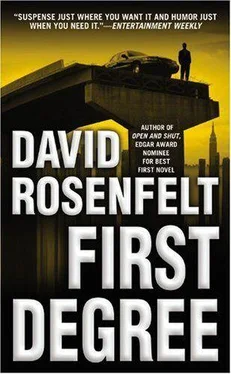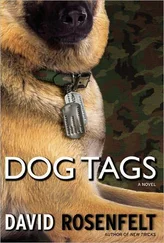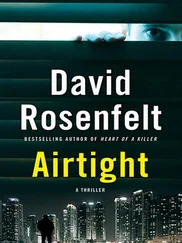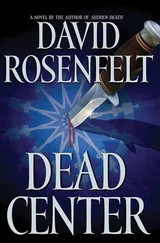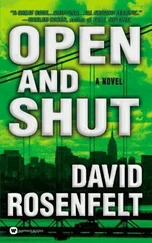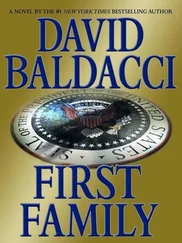David Rosenfelt - First degree
Здесь есть возможность читать онлайн «David Rosenfelt - First degree» весь текст электронной книги совершенно бесплатно (целиком полную версию без сокращений). В некоторых случаях можно слушать аудио, скачать через торрент в формате fb2 и присутствует краткое содержание. Жанр: Детективная фантастика, на английском языке. Описание произведения, (предисловие) а так же отзывы посетителей доступны на портале библиотеки ЛибКат.
- Название:First degree
- Автор:
- Жанр:
- Год:неизвестен
- ISBN:нет данных
- Рейтинг книги:4 / 5. Голосов: 1
-
Избранное:Добавить в избранное
- Отзывы:
-
Ваша оценка:
- 80
- 1
- 2
- 3
- 4
- 5
First degree: краткое содержание, описание и аннотация
Предлагаем к чтению аннотацию, описание, краткое содержание или предисловие (зависит от того, что написал сам автор книги «First degree»). Если вы не нашли необходимую информацию о книге — напишите в комментариях, мы постараемся отыскать её.
First degree — читать онлайн бесплатно полную книгу (весь текст) целиком
Ниже представлен текст книги, разбитый по страницам. Система сохранения места последней прочитанной страницы, позволяет с удобством читать онлайн бесплатно книгу «First degree», без необходимости каждый раз заново искать на чём Вы остановились. Поставьте закладку, и сможете в любой момент перейти на страницу, на которой закончили чтение.
Интервал:
Закладка:
I can feel my pulse start to race as I grab Cahill's file and look for his records during that same six-month period. Sure enough, he is unaccounted for in that time as well, and Murdoch's file, as I expect, is identical in that respect. I'm so excited that if Tara's paws weren't under her chin as she sleeps, I would high-five her.
I can't keep this to myself, so I wake Laurie and tell her what I've discovered. Her reaction is identical to mine: She understands that this could be the break we've been searching for, yet she's all too aware that we have no idea what it means.
I place a call to Captain Reid's office at Fort Monmouth, knowing he isn't there but leaving a message for him to call me back as soon as he can tomorrow morning. I hang up and go upstairs to the bedroom, barely reaching the top of the stairs before the phone rings.
"Hello?"
"Captain Reid here. How can I help you?" he says in his crisp, professional tone.
I'm amazed he has called me back so quickly, and I apologize for disturbing him this late at night. He doesn't react either way, so I quickly get down to why I called, describing the six-month gap in the records of all three men.
There is a noticeable delay in his answer, and when he does speak, it is the first time I have heard him sound tentative and unsure of himself. "There are a number of possible explanations. Record keeping in wartime is not the most accurate, and--"
My bullshit meter is clanging so loud I'm afraid it will wake the neighbors. "Captain Reid," I interrupt, "it is vitally important I get to the truth, and really quickly. I believe that what I've discovered can be very significant, and I need your help in explaining it to me. Please."
Another pause, and then his voice is softer and even more serious. "I was not in Vietnam, so what I'm about to tell you is not something I know from personal experience. As it relates to your case, you should simply consider it informed speculation."
"Fine."
"It may not be true, and even if it is, it may not be true in this particular case. Do you understand?"
"Yes."
"I must have your word that you will never reveal where you heard this."
"You have my word." I hope this preamble is over before the jury reaches a verdict.
"I am told there was a practice of bringing together the most elite members of the Special Forces, often from different divisions, and sending them out in small groups to operate behind enemy lines. Actually, the way the battlefield was drawn in Vietnam, it would be more correct to say 'among the enemy' than behind their lines."
"Operate in what way?" I ask.
"In any way they saw fit," he says. "There were no rules, there were no restrictions. Their mission was to create havoc and destruction, by any means they deemed appropriate."
"Was there any accountability?" I ask.
"I'm not sure you understand what I'm saying. During the times these men were operating, they did not exist. Existence is a prerequisite for accountability, don't you think?"
I'm afraid I know the answer to my next question. "Is there any way I can obtain proof, written proof, that these men were together in one of these squads?"
He hesitates again. "I doubt that even Lieutenant Colonel Prentice could access that information."
I thank Reid, and warn that I may be calling upon him again. Then I spend the next hour processing what I've learned and trying to figure out how I can learn more.
I have no concrete proof that these three men were together in Vietnam, yet I'm certain they were. But even if I do prove it, so what? How does it make Laurie any less guilty, in the eyes of the jurors, of the murder of Alex Dorsey?
Unfortunately, not only are the jurors' eyes clear, but their stomachs are healthy, and the trial resumes at nine in the morning.
Every subject you can name, every single one, comes with a coterie of experts. And the places these experts hang out are the courtrooms of America.
Our first witness today is Dr. Brian Herbeck, widely considered the nation's foremost authority on the spattering of blood. We are paying him ten thousand dollars to impart that expertise to the jury, who will hear how much he is making and will no doubt hate him for it.
Once I establish Dr. Herbeck's considerable credentials as an expert, I have him examine the bloodstained clothes of Laurie's that were behind Hinchcliffe Stadium. He has of course previously examined them, and we've rehearsed exactly what he is prepared to say.
Dr. Herbeck points out in excruciating detail the pattern of blood spatter on both the front and the back of the blouse. His position is that they are essentially matching, which means that, while the blouse may belong to Laurie, neither she nor anyone else was wearing it when it became bloodied. The blood was applied to the front, and it caused a contact stain by going through to the back. If there had been a person in the blouse, he contends, the blood would never have reached the back.
It is a logical, albeit boring presentation, and as Dylan rises to cross-examine, his expression is sort of bemused, as if he and the jury have to deal with eccentrics like this and they might as well do it with a smile.
Dylan has obviously been well schooled in this area, and his cross-examination is impressive. He takes the good doctor back over the clothing, stain by stain, pointing out those areas that don't match quite so perfectly. Dr. Herbeck has answers for each of Dylan's points, but by the time it's all over, there's no way the jury could find any part of the testimony particularly compelling.
All in all, it's a depressing morning. My hopes are beginning to rest almost entirely on the outside investigation we are trying to conduct into the experiences of the three men in Vietnam. An investigation that has every possibility of going nowhere.
Kevin, Marcus, and I have lunch together in the court cafeteria, and they bring me up to date on our progress, or lack of it. Kevin has talked to the lieutenant colonel, who checked and confirmed Captain Reid's view that the information is not accessible. Marcus has learned about the crimes Murdoch committed to get himself put in jail, but this doesn't seem to shed much light on our case.
Having finished his lunch, Kevin cleans up the leftovers on Marcus's tray and my own. He seems about to ask the people at nearby tables if they're going to finish theirs, when Pete Stanton comes over. He had been in an upstairs courtroom testifying on another case and is just checking in to see how we're doing and to lend moral support.
"There have been happier days in defenseland," I say.
He nods and throws a light verbal jab. "Maybe you should let Kevin take over."
"That would help," I counter. "But what we really need is a bozo like you to cross-examine."
We both realize that this banter is halfhearted at best, and he inquires as to how Laurie is doing. He's been a great friend and supporter to her, which she and I will both appreciate pretty much forever. I tell him that she's doing okay and is stronger than I am. Both statements are basically true.
Across the room, having just finished his lunch, is Nick Sabonis. Nick and I haven't talked since he was on the stand, though our paths have crossed on a couple of occasions. My sense is that Nick has not forgiven me for implying that he could possibly be the mysterious lieutenant that Celia Dorsey spoke about.
"I'll be right back," Pete says, standing. "I've got to talk to Nick."
I'm not sure why it hits me this time, but it does, right between the eyes.
"What did you say?" I ask, though I know exactly what he said.
"I said I've got to talk to Nick."
"Call him over here," I say. "Please."
I'm sure that Pete, Kevin, and Marcus can all hear the strange tone in my voice, but I'm not concerned; my focus is totally on Pete and Nick.
Читать дальшеИнтервал:
Закладка:
Похожие книги на «First degree»
Представляем Вашему вниманию похожие книги на «First degree» списком для выбора. Мы отобрали схожую по названию и смыслу литературу в надежде предоставить читателям больше вариантов отыскать новые, интересные, ещё непрочитанные произведения.
Обсуждение, отзывы о книге «First degree» и просто собственные мнения читателей. Оставьте ваши комментарии, напишите, что Вы думаете о произведении, его смысле или главных героях. Укажите что конкретно понравилось, а что нет, и почему Вы так считаете.
